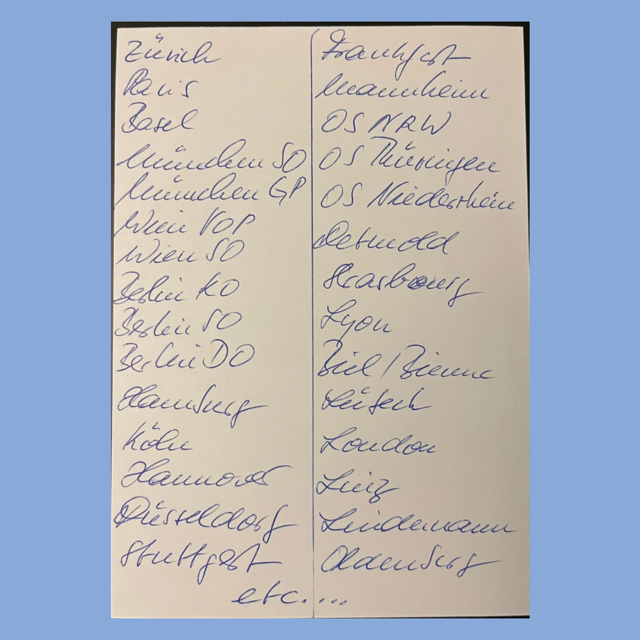Die deutsche Fassung ist hier
Have you almost finished your Master’s degree and decided to apply to an opera studio?
Surely you are aware that a lot of singers (and pianists) apply, especially to the big studios.
This should not deter you from applying, BUT you must realise that the utmost care is required:
Incidentally, the tips in this BLOG are largely based on the feedback I have lately received from the people who handle the applications and are allowed to / must evaluate them.
READ THE JOB ADVERT VERY CAREFULLY!
This may seem obvious, but it seems to be more difficult than you think. Colleagues often tell me about calls or emails like „How can I apply?“. This doesn’t create a personal contact – it just gives the impression that this person can’t read the job advert.
SEND ALL THE REQUESTED DOCUMENTS AT ONCE
This also seems obvious: if three videos are required, don’t just send two and promise to send the last one later. It’s hard to believe how many incomplete applications studios receive that end up in the bin – with 400-800 applications; nobody has the nerve or the manpower to request missing documents.
SEND YOUTUBE OR VIMEO LINKS, AND NO VIDEO DOWNLOADS
It’s not rocket science to post a video on the channels that can be opened with a (not too complicated!) password. Downloads are too large and will overload the servers. The videos should not be older than one year.
The „trick“ of using we transfer to see when the documents were downloaded is well-known and leads nowhere.
BE HONEST IN YOUR CV
So don’t lie about your date of birth – you’ll have to show your passport when you get the job anyway, often with your application.
WRITE A FRIENDLY BUT SHORT EMAIL THAT MAKES IT CLEAR WHICH STUDIO YOU ARE REFERRING TO.
Avoid sentences containing the verb „to dream“. („I have always dreamed of becoming a singer“…)
MAKE SURE THE SUBJECT OF THE EMAIL IS CORRECT:
First name, surname, application OS.
So don’t send an email with „Application for the Hamburg State Opera Opera Studio“ to Berlin…
PLEASE DON’T SEND YOUR DOCUMENTS ON THE LAST DAY
…because the server may crash. Start collecting your documents early; you will need the same ones almost everywhere!
I sound like a stern old owl, but I wouldn’t have considered writing this blog post without the colleagues „in charge“ telling me about the annual difficulties with missing, incorrect or too-old documents.
 (This is not an exhaustive list; you will need to do some more research:))
(This is not an exhaustive list; you will need to do some more research:))
How do you make your recordings?
You need a good microphone. This can be a good clip-on microphone on your smartphone or a camera with a good integrated microphone. While you are still studying, book an appointment at the university’s recording studio – preferably not in the last month of your studies! – and ask one of your répétiteurs if they can accompany you.
Usually, 2-3 recordings from different eras are required, preferably in different languages. Try to find arias with different characters, i.e. not just slow or exclusively fast works.
The camera angle can be a long shot so that you can see the whole person.
It doesn’t have to be a cinematic work of art, but the individual pieces should be without cuts (!) and have great sound quality. (I know, I’m repeating myself!)
The intonation MUST be perfect – (too high is not better than too low btw.)
The videos should be expressive: know what emotion you should/want to portray at what moment. Work on the arias with someone who is familiar with performance training (e.g. a scene pro)
Label the recordings correctly, i.e.
- Composer – Opera – Role – Aria
Recorded on:
Accompaniment: (unless the pianist does not wish to be mentioned)
What belongs in the CV?
Above: in two columns:
Photo (headshot) – friendly and „normal“ (so that people will recognise you if you are invited).
Name, nationality, voice typ (soprano, mezzo, alto, tenor, baritone, bass-baritone, bass),
postal address, mobile number, e-mail address
Below:
- Roles sung on stage, please add where and when
- Important (!) concerts
- Education: where studied, with whom (if you have studied with successful teachers, it is advisable to name them)
- Important masterclasses (list no more than 5-6)
- Prizes and awards
- Other: if you play or have played a sport at a high level, for example, you should mention this, as well as the instruments you play/played well and any social projects
- Languages: which languages do you speak?
Categorise them in classes from A1 – C2 or
Mother tongue – fluent – good – basic knowledge - School education and anything else worth mentioning, such as FSJ (Voluntary Social Year), military service, or an exchange school year, etc.
Repertoire (on an extra sheet):
This list should include the repertoire you could sing in the next few months (not what you would like to sing in ten years) sorted alphabetically by composer – opera – role.
This sheet is optional, depending on whether you have already sung meaningful roles or not.
Good luck with your application. When you have quality to offer, you will succeed!
PS: You don’t necessarily have to start in an opera studio; it’s just as possible to start in an ensemble at a smaller or medium-sized opera house. You can find more information in the Post „The thing with the agencies“
PPS: Sorry for my bossy tone in this article – it’s only for your best:) The next one will be friendlier, I promise.
See you soon,
hedwig
YOU DON’T WANT TO MISS THE NEXT BLOG POST? CLICK HERE
